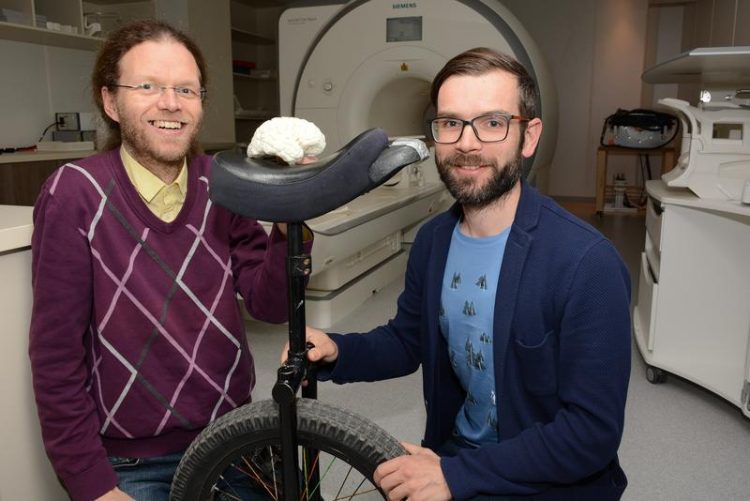Brain research: Learning Unicycling Evokes Manifold Changes in Gray and White Matter Networks

Bernhard Weber (l.) and Karl Koschutnig Photo: University of Graz/Pichler
“Things really start rolling when you learn to ride a unicycle – in your brain as well”, says Bernhard Weber. Riding a unicycle is probably one of the greatest possible challenges to our sense of balance. Children can learn how to do it in about a week. Doctoral student Bernhard Weber and Senior Scientist Karl Koschutnig were surprised that the adult participants in the study were able to learn it just as fast. Something remarkable happened in the brains of these 23 people. The psychologists found significant changes in the grey and white matter, and in the thickness of the cerebral cortex.
The research subjects, who had never sat on a unicycle before, learned and practiced how to ride a unicycle for three weeks; each week, they received four hours of professional instruction. Throughout the study, the researchers used magnetic resonance imaging (MRI) at three points in time to take structural and functional images of the brain: before training began, after the conclusion of the programme, and then again five weeks later.
“These images showed changes in areas of the brain and in motor control networks, visuospatial attention and sensory information processing”, says Koschutnig. “We were particularly surprised that there was one area in which there was a massive reduction in grey matter during the training. Five weeks after the end of the programme, the volume at that position had re-increased again”, says Weber, proffering a possible interpretation:
“The reduction in grey matter could be interpreted as an increase in neuronal efficiency. The brain has learned something and therefore uses less resources. The automatised coordination and balance monitoring are mastered better and more efficiently”. This interpretation is supported by the fact that the better a person had mastered the unicycle riding, the greater the reduction in grey matter.
Results from research on learning how to slackline will provide further insights into the plasticity of the brain. Because the brain is so capable of learning, we can surmise that even acquired deficits could be partially reversible, with the right training.
Bernhard Weber
Tel.: 0043 (0)316 380 5116
E-mail: bernhard.weber@uni-graz.at
Dr. Karl Koschutnig
Tel.: 0043 (0)316 380 4955
E-mail: karl.koschutnig@uni-graz.at
Learning Unicycling Evokes Manifold Changes in Gray and White Matter Networks Related to Motor and Cognitive Functions
Bernhard Weber, Karl Koschutnig, Andreas Schwerdtfeger, Christian Rominger, Ilona Papousek, Elisabeth M. Weiss, Markus Tilp & Andreas Fink
Scientific Reports 9, Article number: 4324 (2019)
http://www.nature.com/articles/s41598-019-40533-6 Publikation
Media Contact
All latest news from the category: Health and Medicine
This subject area encompasses research and studies in the field of human medicine.
Among the wide-ranging list of topics covered here are anesthesiology, anatomy, surgery, human genetics, hygiene and environmental medicine, internal medicine, neurology, pharmacology, physiology, urology and dental medicine.
Newest articles

Why getting in touch with our ‘gerbil brain’ could help machines listen better
Macquarie University researchers have debunked a 75-year-old theory about how humans determine where sounds are coming from, and it could unlock the secret to creating a next generation of more…

Attosecond core-level spectroscopy reveals real-time molecular dynamics
Chemical reactions are complex mechanisms. Many different dynamical processes are involved, affecting both the electrons and the nucleus of the present atoms. Very often the strongly coupled electron and nuclear…

Free-forming organelles help plants adapt to climate change
Scientists uncover how plants “see” shades of light, temperature. Plants’ ability to sense light and temperature, and their ability to adapt to climate change, hinges on free-forming structures in their…





















